八年级英语下册Unit2 What should I do教案
八年级英语下册_unit2_what_should_I_do课件人教版.Section_A

• (5)be +形容词+enough for sb to do sth • be+not+形容词+enough for sb to do sth • The questions are easy enough for students to understand. • The questions are not difficult enough for students to understand.
Grammar should (shall) could (can)
情态动词和其他动词连用,可表示说话人的语气, 可表达建议、要求、可能和意愿等, 没有人称和 数的变化。
a. should与 could用于表示劝告、建议时, 可理解为“应该” , could比should语气委 婉。 b. should (shall)用于表示“必定”。 c. could (can)用于表示 “可能”或“预 Should is more serious than could. 测”。
What’s wrong with the dog?
I often feel very tired. What should I do? You look worried. What’s the matter?
What should he do?
He should have a rest.
be in style=be in fashion时髦的 be out of style 不时髦的
你怎么了? 这一问句通常用于看到别人着急、不愉快、生病 或出了某事故时,来问情况的。 类似的表达还有:
1.What’s wrong with sb/sth?
2.What’s the matter with sb/sth?
英语:Unit_2_What_should_I_do知识点训练课件(人教新目标八年级下)
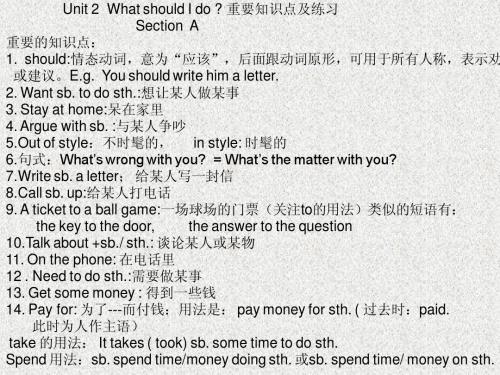
7.—I think you should go to bed early every day. A. Thank you for helping. C B. Of course. C. It doesn’t matter. D .That’s a good idea. 8.”_______” “I argued with my best friend.” A. How are you? B B. What’s wrong? C. Can I help you? D .Good morning! 三.句型转换: 1 .Could you ask him to give me a call, please? (改写同义句) Could you ask him to _____ _____ ______, please? call me up 2 .Dave had a headache last night.(对划线部分题问) _____ _____ _____ _____ with Dave? What the matter with 3. You should buy some new clothes. What should do _____ _____ I _______? 4. He should ask their parents for some money.(否定句) shouldn’t ask any He ________ _____ their parents for ______money. 5. The room is too small to hold so many people.(同义句) big enough The room isn’t ______ ______ to hold so many people. 6. His father bought him a new computer.(同义句) His father bought a new computer _____ him. ______ for 7.Tom spent 20 yuan on a book last Sunday.(同义句) paid for Tom _____ 20 yuan _____ a book last Sunday. 8.The box is too heavy for me to carry.(同义句) The box isn’t light enoughfor me to carry. _____ _____ 9. Anna paid 200 yuan for the new jacket.(同义句) Anna spent yuan _____ the new jacket. ______ on
八年级英语 unit2 what should I do课件人教

My clothes are out of style.
不时髦的
Look at the problems in activity 1a and make conversations.
A: What’s wrong?
B: My clothes are out of style. A: Maybe you should buy some new clothes.
1a Look at these problems. Are they serious or not?
Write them in the appropriate box.
Serious
Not serious
My parents want me to stay at home every night.
Task 1:成长中的烦恼
Do you have some problems in your daily life or in your study? Write them down.
1. My parents want me to stay at home every night. 2. I don’t have enough money to… . 3. I argued with … . 4. My friends didn’t invite me to his birthday party. 5. … …
Do you have any good suggestions?
eg: I argued with my best friend. What should I do?
You could … . Maybe you should … . I think you should … . I think you’d better … . You shouldn’t … .
八年级英语下册-unit2-What-should-I-do整单元课件-人教新目标版
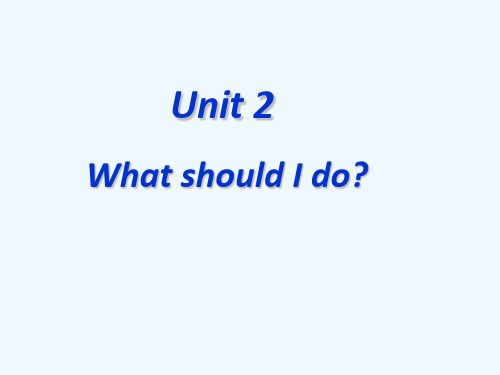
argued with
What's wrong? What should she do?
What's wrong? What’s the matter? What should she do?
...plays his CDs too loud
A: What's wrong? B: My clothes are out of style. A: Maybe you should buy some
Everybody has his or her problems.
I have mine. What's it? My mom plays music too loud. I can't stand it at all. What should I do? You should...
play v.播放
2a Listen. Peter's friend is giving him advice. Circle the word "could" or "should".
____________________
give him a call ______________ phone him
__________________________
2b Listen again.
Why doesn’t Peter like his friend’s advice?
Draw lines to match the advice with the reasons.
Advice
1. You could write him a letter. 2. Maybe you should call him up. 3. You should say you’re sorry. 4. Maybe you could go to his house. 5. You could give him a ticket to a ball game.
八年级英语下册Unit 2 What should I do- 知识讲解

八年级英语下册Unit 2 What should Ido? 知识讲解Unit2whatshouldIdo?【单元目标】1.单词与短语stereo,loud,argue,original,serious,style,wrong,argu ment,either,teen,talk,family,tutor,haircut,caller,e xcept,upset.wantsb.todosth. 2.playone’sstereo 3 stayathome4.arguewithsb/haveanargumentwithsb.5.beoutofstyle6.writesbaletter/writeto7.talkabout8.onthephone9.surprisesb.10.payfor 11.getapart-timejob 12.borrowsth.fromsb.13.asksb.for…14. haveabakesale 15.findout16.beupset17. call…up 18.thesameas9. getonwellwithsb.20. returnsth.21.haveafightwithsb.22.from…to…23. dropoff 24.preparefor25.after-schoolclubs26.beusedto27.fillup 28.takethemiddleroad2.目标句型:.whatshouldIdo?2.whydon’tyou…?3.youcould…4.youshould…5.youshouldn’t…3.语法情态动词的用法Ⅰ【重难点分析】情态动词Ⅰ*情态动词也可称为“情态助动词”,因为它和基本助动词都属于助动词类。
*情态动词和其他动词连用,可表示说话人的语气。
*情态动词可表达建议、要求、可能和意愿等。
*情态动词没有人称和数的变化。
*常用的情态动词有:can,could,may,might,must,shall,should,will,would这九大情态动词;其他的还有oughtto,need,dare等。
八年级英语下册_unit2_what_should_I_do课件人教版

Yours,
Mary
I. 根据汉语提示,完成下列句子。每空一词。
1. 我花了五美元买这些书。 paid for spent on I ________ five dollars ________ the books. 2. 我问他如何才能学好英语。 how to learn I asked him _______________ English well. 3. 你认为她会和你就那件事争吵吗? argue with about Do you think she will _________you ________ that?
Language points:
1. find out,找出;查明 find out 意为“找出” “发现” “ 查出(真 相) ” find和find out都有发现的意思,二者的语义差别是:find往往指凭一时的
直接感觉或偶然发现,而find out则需经一番努力后发现出来,有“查明,
弄清”的意思。
2. I don’t know what to do. 我不知道该做什么。
疑问词 + 动词不定式结构,表示一个完整的 含义,在句中可以做主语,宾语,表语等。 这种结构经常放在tell,show,teach,forget,find out等词后作宾语。
I can’t decide where to go for vacation. I asked her how to make dumplings.
Language points:
tell sb. to do sth. 告诉某人做某事 Mother told me to have healthy food to keep fit. tell sb. not to do sth. 告诉某人不做某事 The teacher tells us not to talk in class.
八年级英语unit 2 what should i do人教版(新目标)知识精讲
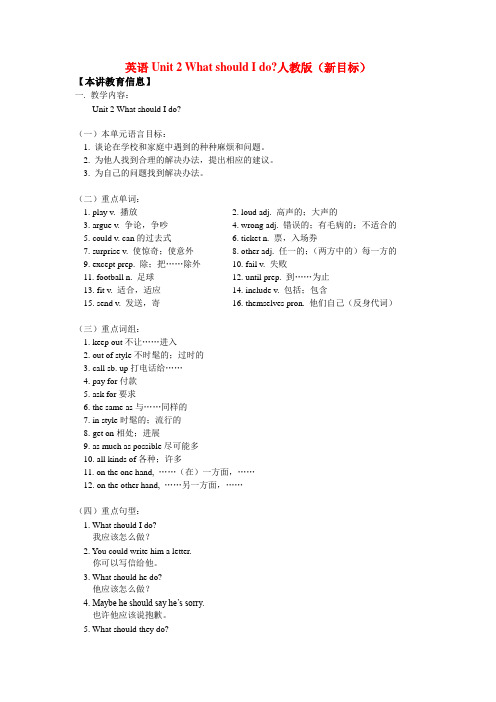
英语Unit 2 What should I do?人教版(新目标)【本讲教育信息】一. 教学内容:Unit 2 What should I do?(一)本单元语言目标:1. 谈论在学校和家庭中遇到的种种麻烦和问题。
2. 为他人找到合理的解决办法,提出相应的建议。
3. 为自己的问题找到解决办法。
(二)重点单词:1. play v. 播放2. loud adj. 高声的;大声的3. argue v. 争论,争吵4. wrong adj. 错误的;有毛病的;不适合的5. could v. can的过去式6. ticket n. 票,入场券7. surprise v. 使惊奇;使意外8. other adj. 任一的;(两方中的)每一方的9. except prep. 除;把……除外10. fail v. 失败11. football n. 足球12. until prep. 到……为止13. fit v. 适合,适应14. include v. 包括;包含15. send v. 发送,寄16. themselves pron. 他们自己(反身代词)(三)重点词组:1. keep out不让……进入2. out of style不时髦的;过时的3. call sb. up打电话给……4. pay for付款5. ask for要求6. the same as与……同样的7. in style时髦的;流行的8. get on相处;进展9. as much as possible尽可能多10. all kinds of各种;许多11. on the one hand, ……(在)一方面,……12. on the other hand, ……另一方面,……(四)重点句型:1. What should I do?我应该怎么做?2. You could write him a letter.你可以写信给他。
3. What should he do?他应该怎么做?4. Maybe he should say he’s sorry.也许他应该说抱歉。
人教版初二八年级英语下册 unit 2 what should i doPPT课件

• 2a Listening
___ My friend has nicer clothes than I do . ___ MБайду номын сангаас friend wears the same clothes and has the same haircut as I do.
haircut: 1) when you have a haircut, someone cuts your ___ I don’t my理发 friend’s clothes hair like for you eg: You need a haircut. and haircut. 2) the style your hair is cut in 发型 eg: Do you like my new haircut?
2b What advice do people give Erin?
Person
Advice
She should tell her friend to get different clothes and a different haircut. Nicole She should be happy that her friend likes her clothes and haircut. That’s not a problem.
Kim
Emilio She should find a new best friend.
Typescript
Host: Hi, Erin. thanks for calling Teen Talk 109.1 FM. What’s the problem? Erin: Well, see, I always wear fashionable clothes, and I have a really neat(整洁) haircut. Host: Yes? Erin: It’s my friend, Jasmine. She buys the same clothes as I do, and she even gets the same haircut. She copies everything I do. I want to be original. I want to have my own clothes and my own haircut. Host: Let’s see if a listener has some advice for you. Kim is calling. Hello, Kim. Kim: Hello.
【人教版新目标】英语八年级下册Unit2单元教案
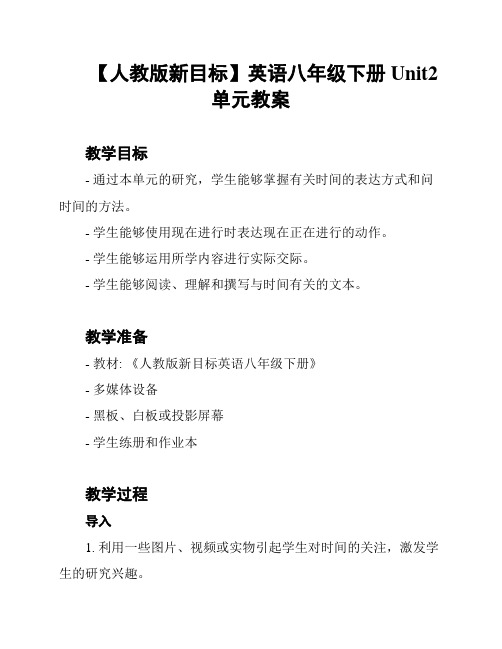
【人教版新目标】英语八年级下册Unit2
单元教案
教学目标
- 通过本单元的研究,学生能够掌握有关时间的表达方式和问时间的方法。
- 学生能够使用现在进行时表达现在正在进行的动作。
- 学生能够运用所学内容进行实际交际。
- 学生能够阅读、理解和撰写与时间有关的文本。
教学准备
- 教材: 《人教版新目标英语八年级下册》
- 多媒体设备
- 黑板、白板或投影屏幕
- 学生练册和作业本
教学过程
导入
1. 利用一些图片、视频或实物引起学生对时间的关注,激发学生的研究兴趣。
规范研究
1. 引导学生研究本单元的词汇和短语,对其进行拼读、理解和运用练。
2. 让学生听录音和跟读对话,掌握现在进行时表达现在正在进行的动作。
拓展研究
1. 带领学生进行交际练,让他们能够用英语问时间和回答时间的问题。
2. 分组进行对话练,加强学生的口语表达能力。
提升研究
1. 给学生分发阅读材料,让他们阅读并回答相关问题,加深对时间概念的理解。
2. 引导学生进行写作练,让他们写一篇短文描述自己一天的日常活动。
教学评估
- 通过学生的课堂表现和活动练,以及书面作业的完成情况来评估学生的掌握程度和进步情况。
教学延伸
- 建议学生在课后进行相关的阅读和听力练,加强对时间的理解和运用能力。
参考资源
- 《人教版新目标英语八年级下册教材》
- 互联网资源(如图片、视频、文章等)。
八年级英语下册 Unit2学案 人教新目标版
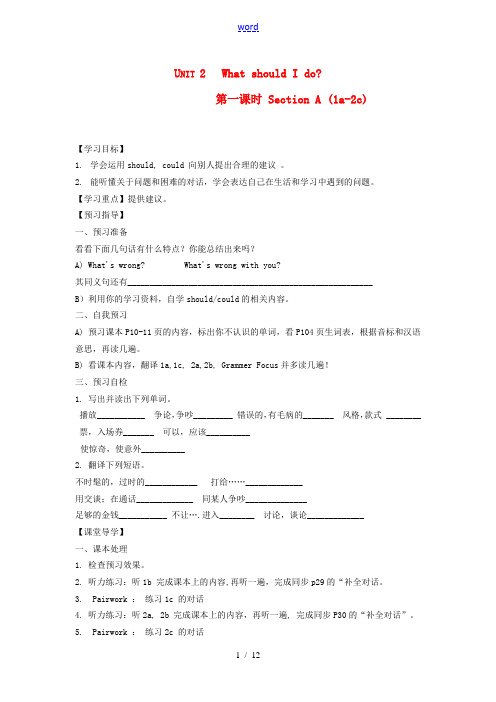
U NIT 2 What should I do?第一课时 Section A (1a-2c)【学习目标】1.学会运用should, could 向别人提出合理的建议。
2.能听懂关于问题和困难的对话,学会表达自己在生活和学习中遇到的问题。
【学习重点】提供建议。
【预习指导】一、预习准备看看下面几句话有什么特点?你能总结出来吗?A) What's wrong? What's wrong with you?其同义句还有________________________________________________________B)利用你的学习资料,自学should/could的相关内容。
二、自我预习A) 预习课本P10-11页的内容,标出你不认识的单词,看P104页生词表,根据音标和汉语意思,再读几遍。
B) 看课本内容,翻译1a,1c, 2a,2b, Grammer Focus并多读几遍!三、预习自检1. 写出并读出下列单词。
播放___________ 争论,争吵_________ 错误的,有毛病的_______ 风格,款式 ________ 票,入场券_______ 可以,应该__________使惊奇,使意外__________2. 翻译下列短语。
不时髦的,过时的____________ 打给……_____________用交谈;在通话_____________ 同某人争吵______________足够的金钱___________ 不让….进入________ 讨论,谈论_____________【课堂导学】一、课本处理1. 检查预习效果。
2. 听力练习:听1b 完成课本上的内容,再听一遍,完成同步p29的“补全对话。
3. Pairwork :练习1c 的对话4. 听力练习:听2a, 2b 完成课本上的内容,再听一遍, 完成同步P30的“补全对话”。
5. Pairwork :练习2c 的对话二、讲练互动参考同步p301 should是________的过去式,用作情态动词时,并不表示_______的动作,只是语气显得更加________。
八年级英语下册unit2whatshouldido导学案

Unit 2 What should I do?Section A (1a-2c)预习案Ⅰ预习导学一、词汇精粹学习建议从课本1a-2c中找出下列单词、短语。
1. 播放2. 争吵;争论3. keep out4. 错误的5. style6.票;入场券7.使惊奇 8.could 9. out ofstyle10. call sb. up 11. 用电话交谈二、听力内容预测(一)牢记P10-P11出现的生词,扫清听力障碍。
(二)观察1a上面的图片和下面的句子,大胆预测:1. What’s the girl thinking in the picture on the top left corner(左上角)?2. What does another girl suggest(建议)to her?3. Should she argue with her parents?三、语法聚焦翻译下列句子。
1.“What’s wrong?”“My clothes are out of style.”2.“What should I do?”“You should say you’re sorry.”3.“What should he do?”“Maybe he should write her a letter.”看一看:1.找出例句1的问句同义句。
2.以上句子中是用哪个单词提建议的,哪一个副词使建议的语气更加委婉?3.将例句2的答语变为否定句。
Ⅱ预习自测一、词汇精粹1. We must have a to watch a movie.2. It’s rude to with others when you have different opinions.3. My son gave me some flowers on Mother’s Day. It really (使惊奇)me.4. The word means“not right”. It is “”5. When a coat is not fashionable,we call it .二、语法聚焦将下列对话搭配起来。
八年级英语下册 Unit 2 What should I do(第4课时)Section B 1a-2c教案 人教新目标版
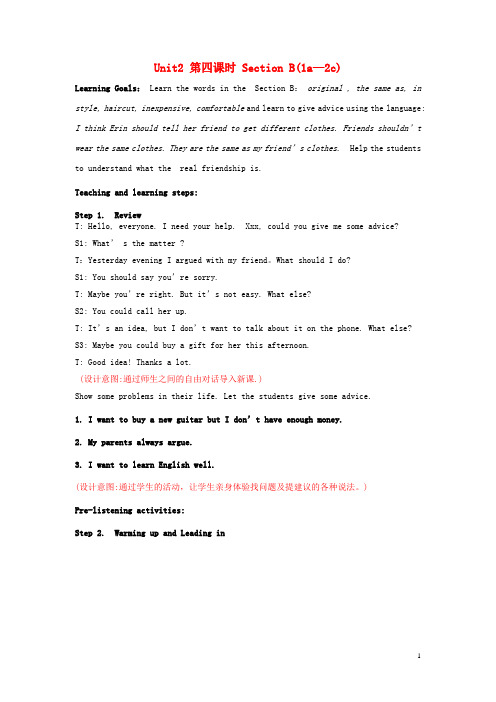
Unit2 第四课时 Section B(1a—2c)Learning Goals: Learn the words in the Section B: original , the same as, in style, haircut, inexpensive, comfortable and learn to give advice using the language: I think Erin should tell her friend to get different clothes. Friends shouldn’t wear the same clothes. They are the same as my friend’s clothes. Help the students to understand what the real friendship is.Teaching and learning steps:Step 1. ReviewT: Hello, everyone. I need your help. Xxx, could you give me some advice?S1: W hat’ s the matter ?T:Yesterday evening I argued with my friend。
What should I do?S1: You should say you’re sorry.T: Maybe you’re right. But i t’s not easy. What else?S2: You could call her up.T: It’s an idea, but I don’t want to talk about it on the phone. What else?S3: Maybe you could buy a gift for her this afternoon.T: Good idea! Thanks a lot.(设计意图:通过师生之间的自由对话导入新课.)Show some problems in their life. Let the students give some advice.1. I want to buy a new guitar but I don’t have enough money.2. My parents always argue.3. I want to learn English well.(设计意图:通过学生的活动,让学生亲身体验找问题及提建议的各种说法。
人教版新目标八年级下册英语教案:Unit2WhatshouldIdo?
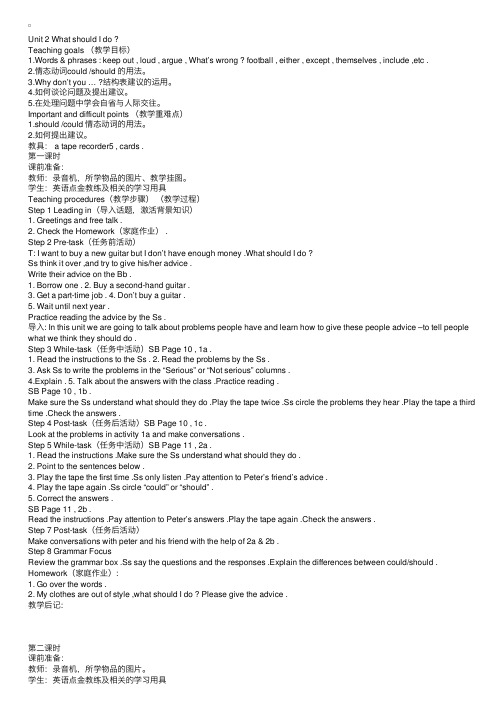
Unit 2 What should I do ?Teaching goals (教学⽬标)1.Words & phrases : keep out , loud , argue , What’s wrong ? football , either , except , themselves , include ,etc .2.情态动词could /should 的⽤法。
3.Why don’t you … ?结构表建议的运⽤。
4.如何谈论问题及提出建议。
5.在处理问题中学会⾃省与⼈际交往。
Important and difficult points (教学重难点)1.should /could 情态动词的⽤法。
2.如何提出建议。
教具: a tape recorder5 , cards .第⼀课时课前准备:教师:录⾳机,所学物品的图⽚、教学挂图。
学⽣:英语点⾦教练及相关的学习⽤具Teaching procedures(教学步骤)(教学过程)Step 1 Leading in(导⼊话题,激活背景知识)1. Greetings and free talk .2. Check the Homework(家庭作业) .Step 2 Pre-task(任务前活动)T: I want to buy a new guitar but I don’t have enough money .What should I do ?Ss think it over ,and try to give his/her advice .Write their advice on the Bb .1. Borrow one .2. Buy a second-hand guitar .3. Get a part-time job .4. Don’t buy a guitar .5. Wait until next year .Practice reading the advice by the Ss .导⼊: In this unit we are going to talk about problems people have and learn how to give these people advice –to tell people what we think they should do .Step 3 While-task(任务中活动)SB Page 10 , 1a .1. Read the instructions to the Ss .2. Read the problems by the Ss .3. Ask Ss to write the problems in the “Serious” or “Not serious” columns .4.Explain .5. Talk about the answers with the class .Practice reading .SB Page 10 , 1b .Make sure the Ss understand what should they do .Play the tape twice .Ss circle the problems they hear .Play the tape a third time .Check the answers .Step 4 Post-task(任务后活动)SB Page 10 , 1c .Look at the problems in activity 1a and make conversations .Step 5 While-task(任务中活动)SB Page 11 , 2a .1. Read the instructions .Make sure the Ss understand what should they do .2. Point to the sentences below .3. Play the tape the first time .Ss only listen .Pay attention to Peter’s friend’s advice .4. Play the tape again .Ss circle “could” or “should” .5. Correct the answers .SB Page 11 , 2b .Read the instructions .Pay attention to Peter’s answers .Play the tape again .Check the answers .Step 7 Post-task(任务后活动)Make conversations with peter and his friend with the help of 2a & 2b .Step 8 Grammar FocusReview the grammar box .Ss say the questions and the responses .Explain the differences between could/should . Homework(家庭作业):1. Go over the words .2. My clothes are out of style ,what should I do ? Please give the advice .教学后记:第⼆课时课前准备:教师:录⾳机,所学物品的图⽚。
人教版八年级下册英语第二单元unit2知识点总结

人教版八年级下册英语第二单元unit2知识点总结Unit 2 What should I do?一丶重点短语1.argue v.争论;争吵argue with sb.与某人吵架I argued with my best friend.我和我的好朋友吵架了。
2.① either adv.(用于否定句)也He doesn’t have any money, and I don’t, either.他没有钱,我也没有。
I can’t play chess. She can’t, either.我不会下国际象棋,她也不会。
② too 也(用于肯定或疑问句)I’m a teacher.He is a teacher, too.我是老师,他也是老师。
3.ask (sb.)for sth.向某人寻求某物;要……Don't ask for food every day.Go and find some work.别天天要饭,找点儿工作做。
I don’t thi nk you should ask your parents for some money.我想你不应向父母要钱。
4.the same as... 与……相同(注意前后两个比较对象的属性保持一致)The clothes are the same as my friends'.这些衣服与我朋友的一样。
Tom is the same age as Anna.=Tom is as old as Anna.汤姆和安娜一样大。
Her backpack is the same as mine. 她的背包与我的一样。
5.except 除……以外;(不包括……在内)My class has been invited except me.除我以外,我的同学都被邀请了。
All the students went to the park except him.除了他之外,全体同学都去过公园了。
新课标人教版八年级英语下册Unit 2 What should I do(1)

Unit 2 What should I do(1)单元教材分析学会should ,Why don’t you和could在英语中的习惯用法。
使用这些习惯用法,就自己生活、学习中存在的某些实际问题提出建议;拒绝、接受别人的建议。
在学习贴近学生生活实际的语言知识的同时,特别关注学生生活和学习中的真实困难和烦恼。
进一步引导学生对自我和周围世界进行比较客观的认识、评价,发展学生主动解决问题的自我意识和行为能力。
发展学生与人和谐交往的能力;培养在学生交流中寻求帮助。
既坚持自己观点、又听取别人建议。
单元总体目标1. The students will learn to talk about problems.2. The students can help people in trouble and how to give advice.3. Practice the sentences with “could, couldn’t, shouldn’t”.4. To learn the words and expressions about reading passage.单元重难点一览单元学情分析In this unit students learn to talk about problems and give advice. First make up a problem you might be having and write you could do about it. Secondly read the problem to the class again and help the class give advice using the words could, should, shouldn’t. In the end, make sentences with the words and write some letters or make conversations.单元教学建议Ask the students to read papers or magazines to find some problems the people have, then ask the students to make a chart with each problem. Ask some students to write a paragraph about the worst advice they ever got, and guess what the problem is. Maybe ask three or five students to work in group for a radio talk show where people call in for advice.单元课时分配Five periods第一课时教学内容1. To learn the words and expressions about this period.2.To talk about the problems serious or not for them in daily life.3.To learn how to describe the problems you have or how to help others to give him orher some advice.教学目标知识与能力1. Knowledge aims: Words and expressions; How to use should, could, shouldn’t;2. Ability aims: Express the good ideas to solve the problems;Help others when they are in trouble.过程与方法首先谈论生活中严肃或不严肃的事情;通过听力训练和口语表达学会如何表达自己的困难,如何给别人提建议等;通过谈论表达自己对有些困难的理解,提出个人不同的建议。
2013中考英语复习课本知识整理八年级下 Unit 2 What should I do导学案
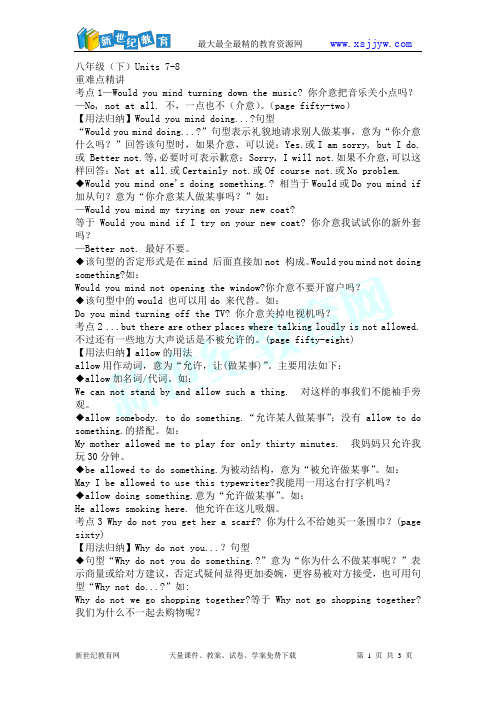
八年级(下)Units 7-8重难点精讲考点1—Would you mind turning down the music? 你介意把音乐关小点吗?—No, not at all. 不,一点也不(介意)。
(page fifty-two)【用法归纳】Would you mind doing...?句型“Would you mind doing...?”句型表示礼貌地请求别人做某事,意为“你介意什么吗?”回答该句型时,如果介意,可以说:Yes.或I am sorry, but I do. 或 Better not.等,必要时可表示歉意:Sorry, I will not.如果不介意,可以这样回答:Not at all.或Certainly not.或Of course not.或No problem.◆Would you mind one's doing something.? 相当于Would或Do you mind if 加从句?意为“你介意某人做某事吗?”如:—Would you mind my trying on your new coat?等于Would you mind if I try on your new coat? 你介意我试试你的新外套吗?—Better not. 最好不要。
◆该句型的否定形式是在mind 后面直接加not 构成。
Would you mind not doing something?如:Would you mind not opening the window?你介意不要开窗户吗?◆该句型中的would 也可以用do 来代替。
如:Do you mind turning off the TV? 你介意关掉电视机吗?考点2 ...but there are other places where talking loudly is not allowed. 不过还有一些地方大声说话是不被允许的。
湖北省襄阳市第四十七中学八年级英语下册《Unit 2 What should I do Section B》学案(无答案) 人教新目标

湖北省襄阳市第四十七中学八年级英语下册《Unit 2 What should I do Section B》学案(无答案)人教新目标版【预习目标】:知识目标:1.识记单词及短语。
except, fail, until, fit, include, send, themselves, freedom, in style, as...as possible, on the one hand, on the other hand2.句型1). My friends wear the same clothes and has the same haircut as I do.2). I’m upset and don’t know what to do.能力目标:能为自己的问题找到解决办法。
情感态度与价值观:能正确处理自己生活、学习、家庭中出现的问题,乐于帮助别人。
【预习重难点】:重点目标2 难点情态动词could, should的用法。
自主预习(一)预习任务1.写出下列单词及短语新颖的_________理发___________ 把……除外_______心烦的________与……同样的__________________ 时髦的_________________把作业忘在学校里__________________2. Finish 1a3. Read 3a and underlie the problems. Then translate it into Chinese (译成汉语)4. Read 3a and tell T or F1) Lonely Kid wrote this letter to a newspaper advice column.2) He was thought he was popular at school.3) He wasn’t invited to the birthday and he wasn’t epset.4) He really knew what to do.(二)预习诊断1.The clothes are only 10 yuan. They are ______ ( expensive) .2.My friend has _______ (nice) clothes than I do.3.I think Erin should tell her fri end ____ ( get) different clothes.4.Friends shouldn’t ________ (wear) the same clothes.5.Her clothes are ________(color) and style.(三)预习反思 Do you have any ques tions ?二.课中实施Step 1 预习交流------ 精讲点拨I don’t know what to do. What to do 是疑问词+动词不定式结构。
- 1、下载文档前请自行甄别文档内容的完整性,平台不提供额外的编辑、内容补充、找答案等附加服务。
- 2、"仅部分预览"的文档,不可在线预览部分如存在完整性等问题,可反馈申请退款(可完整预览的文档不适用该条件!)。
- 3、如文档侵犯您的权益,请联系客服反馈,我们会尽快为您处理(人工客服工作时间:9:00-18:30)。
Unit 2 What should I do ?I. Teaching aims and teaching demands:In this unit students learn to talk about problems and give advice.II. Teaching key and difficult points:A. Vocabularyargue, loud, original ,out of style, tutor, upset, adult,Recycling: problem, sorry, part-time, important, friend, money, home, new, easy, letter, ticket, ball game, surprise, colorful, borrow, write, call someone up, go to someone’s house, every nightB. Target languageMy brother plays his CD too loud.What should I do ?Why don’t you talk to him about it?C. StructuresModals could, shouldWhy don’t you …?(formulaic)III. Teaching methods: Audio-lingual methodsIV. Teaching aids: a tape recorderV. This unit is divided into seven periods.Lesson 1 Speak and listenSection A 1a---1cI. Teaching aims and demands:Students learn to talk about problems and give advice.II. Teaching key and difficult points:A. Vocabularykeep out , play, loud, argue, wrong, What’s wrong ? out of style , could, should,B. Target languageMy brother plays his CDs too loud.Maybe you should buy some new clothes.III. Teaching methods: Audio-lingual methodsIV. Teaching aids: a tape recorderV. Teaching procedureActivity 1. RevisionTask 1. DictationTask 2. Ask and answer.Questions about future with will.Activity 2. PresentationThis activity introduces some new vocabulary.Task 1 . Make a two-column chart on the board with the heading Problem at the top of column 1 and the heading Advice at the top of column 2 .Then ask the students to tell you what you could do about it.Task 2. Then read the problem to the class again. Then write the words could ,should ,and shouldn’t on the board next to the chart. Read the problem to the class again and help the class give advice using the words could, should ,and shouldn’t.Task 3. Ask the students to finish the task in 1a.Teach : Serious problem is a very bad problem, a very big problem. Out of style means not in fashion.enough money : I don’t have enough money to buy a bike.Ask the students to write the problems in the serious or Not serious column. Task 4. Talk about the answers.Ask ,Who put “My parents want me to stay at home every night?” the serious column? Ask the same questions about the other items. Discuss which problems students thought were the most serious.Activity3. Listen and circle the problems you hear in activity 1a.Task 1.Point to the pictures in activity 1a. Ask different students to say what they see in each picture. Read the instructions to students.Task 2. Play the recording the first time. Students only listen.Task 3. Play the recording a second time. Students circle the problems they hear. Then check the answers.Step4. PairworkAsk the students to look at the problems in activity 1a and make conversations.Homework1. Make up your own conversations.2. Make ten sentences with co uld, should and shouldn’t.Lesson 2 Listen and speakSection A 2a---Grammar FocusI. Teaching aims and demands :Students learn to talk about problems and give advice.II. Teaching key and difficult points:A. Vocabularycall sb. up, ticket, surprise, on the phone, What’s the matter?B. Target languageYou could go to his house.You could give him a ticket to a ball game.What should I /he/they do ?III. Teaching methods: Audio-lingual methods and PPPIV. Teaching aids: a tape recorderV.Teaching procedureActivity 1. RevisionTask1. Check the homework. Ask and answer.Task2. Revise the vocabulary.Activity 2. Listening and circling .Task1.Read the instructions. Learn the key vocabulary.Read and repeat the phrases.Task2.You will hear a conversation between Nari and a friend.Play the recording twice and students circle the word ,Nari’s friend uses to give advice.Then check the answers.Activity 3.ListeningTask 1. Read the instructions. Show students the example match.Task 2. Play the recording again and check the answers.Activity 4. GroupworkTask 1.Read the instructions for the activity.Task 2. Point to the example in the sample dialogue. Ask two students to read the conversation to class.Task 3. Ask students to role play a conversation between Nari and his friend using these two sets of sentences.Then have the students work in pairs. Task 4. Check the answers by calling on different pairs to say a conversation to the class.Activity 5. Grammar FocusReview the grammar box.ask the students to say the questions and the responses. Explain that the word should is always used to ask for advice,but the words could, should, and shouldn’t are used to give advice. Could is a less serious word than should.Pay attention to the questions and answers, ask and answer loudly. Homework1. Review the conversation and the vocabulary.2. Write your own conversations on giving advice.Lesson 3 Reading and writingI. Teaching aims and demands :Students learn to talk about problems and give advice.II. Teaching key and difficult points:A. Vocabularypay for, part-time job, okay, either, bake, Teen Talk, tutor, need, maybe, good idea, bad idea, okay ideaB. Target languageWhat should I do ?Then I think you should get a part- time job.III. Teaching methods: Audio-lingual methods and Control-reading and writing.IV. Teaching aids: a pictureV.Teaching procedureActivity 1. RevisionTask 1.Revise the vocabulary and the key structures.Task 2.Dictation.Activity 2. Reading and writingTask 1 .Read the instructions. Write the possible responses on the Bb and ask a student to read the responses to the class. Discuss the three responses and be sure students understand how the responses are used. Task 2. Ask four students to read the conversation to the class.Ask the students to fill in the blank.Then ask and answer in groups.Activity 3. PairworkTask 1. Read the instructions.And then ask two students to read the sample conversation.Task2.Ask the students to say some ways to get money that aren’t in the book.Task 3. ask the students to work with partners as they ask for and give advice.Then ask two or three pairs of the students to say their conversations to the class.Activity 4. PairworkThis activity provides an opportunity for students to use the language of the unit to give advice.Task 1. Read the instructions. Then ask two students to read the dialogue. Task 2. Ask another pair of students to give their advice on another topic. Pick a topic of current interest in the news.Homework1.Review the vocabulary and target language.2.Write your own conversations about problems and advice.Lesson 4 Section BI. Teaching aims and demands :Students practice using the target language.II. Teaching key and difficult points:A. Vocabularyoriginal , the same as, in style, nicer, haircut, inexpensive, comfortable B. Target languageI think Erin should tell her friend to get different clothes.Friends shouldn’t wear the same clothes.They are the same as my friend’s clothes.III. Teaching methods: Audio-lingual methodsIV. Teaching aids: a tape recorderV. Teaching procedureActivity 1. RevisionThis activity introduces the key vocabulary.Task 1.Read the instructions in 1a. Ask a student to read the sentences to the class.Read each sentence again and ask the Ss to repeat it. Then explain in their own words that each sentence means.For example: T: What does original mean?S1: Different from others. Not the same.T: Correct. When something is original, it is not like all theothers. Can you give an example?S1:My watch doesn’t have numbers on it. It has pictures offaces instead of numbers. My watch is original.T: Correct. It’s not like all the others.Task 2.Point out the write-in line in front of each sentence. write VI if the statement is very important to you, write I if the statement is somewhat important to you, and write NI if it is not important.Task 3. Talk about the answers with the class.Activity 2. ListeningTask 1. Read the instructions.Point to the three items students will be listening for:Say you will be listening to a radio advice program. People call in for help with a problem and other people call up with advice. They will be talking about one of these problems. Please check the problem they talk about. Task 2. Play the recording the first time. Students only listen.Task 3. Play the recording a second time.Ask the students to put a check in front of these problems. Then check the answer.Activity 3.Listening and writingA. Listen carefully and fill in the chart with the advice that you hear .Thencheck the answers .B. Listen again and fill in the chart. Then check the answers.Activity 4. PairworkTask 1.Read the instructions.Task 2.Ask two students to read the conversation to the class.Task 3. Work with the partners and say what do you think Erin should do. Ask some pairs of students to say part of their conversation to the class. Homework1.Review the vocabulary .2.Write your own conversations about advice.Lesson 5 Reading and writingI.Teaching aims and demands :Students practice the target language by reading and writing.II. Teaching key and difficult points:A.Vocabularyexcept, upset, find out, do wrong, what to do, lonely, argueB.Target languageWhat should I do ?You could be more friendly.You should try to be funny.Everyone else in my class was invited except me.I’m very upset and don’t know what to do.I just found out that my friends were planning a birthday party for my best friend,…III. Teaching methods: Audio-lingual methods and Control-writing.IV. Teaching aids: a tape recorderV.Teaching procedureStep 1. RevisionTask1. Check the homework. Ask and answer.Task2.Revise the vocabulary.Step 2. Reading and writingTask 1.Teach these words:except: Everyone has a bike except Jim.Everyone has a bike besides Jim.find out: learn, Please find out where they live.I can’t think what I did wrong.I don’t know what to do.Task 2. Ask the students to read the instructions.Task 3. Ask the students to read the letter and underline the problem on their own.Correct the answers.Step 3. WritingTask 1. Read the instructions.Ask a student to say some of the advice they might give. Write the key words on the board.Task 2. Ask the students to write the letters on their own.Task 3. Ask some students to read their letters to the class.Step 4. Writing on your own.1. read the instructions.2. ask the students to say some problems they might write about.3. ask some students to read their letters.Step 5. Groupwork1. Ask the students to read the instructions.2. Ask two students to read the dialogue.3. Ask another pair of students to give their advice for one of the problems.4. Ask students to complete the work in groups.5. Ask a few students to share the sample conversations.Step 6.Self Check1. Ask the students to do the exercises on their own .Then check theanswers.2. Read the letter and then write some advice.3. Ask a few students to read their letters of advice.4. Just for fun. Ask two students to read the conversation to the class. Homework1.Review the vocabulary .2.Finish off the writing exercises.Lesson 6 Reading and writingI. Teaching aims and demands :Students learn to master the reading skills.II.Teaching key and difficult points:A. Vocabularyuntil, fit, as much as possible, pressure, complain, include, pushy, send, all kinds of, compare, crazy, adult, on the one hand, …organized, on the other hand,…B. Target languageWhat should you do to relax?Parents should learn to give their kids a bit more time to themselves.III. Teaching methods: Audio-lingual methods and Control-reading and writing.IV. Teaching aids: a tape-playerV.Teaching procedureActivity 1. RevisionTask 1.Revise the vocabulary and the key structures.Task 2.Dictation.Activity 2. Before You ReadTask 1 .Read the instructions.1. Encourage the students to think about life outside school hours. Listthem on the Bb.2. Ask the students to use the list on the Bb to complete the two boxeslabeled ‘I do’, and ‘I don’t do-‘. They are free to add any ore activities t hey do, or don’t currently.3. Ask a few students to share what they have written.Task 2.Teach the students about using a dictionary.1. Explain that a dictionary can help students learn independently.They canlearn new words, how to pronounce them, and how to use themcorrectly.2. Let the students to look up the words in the box.3. Have a brief memory quiz on all the words.4. Discuss the points made in the Reading Strategy about using abilingual ,learner’s and electronic dictionary.Activity 3. While You ReadingTask 1. Ask the students to read and notice the words they have just looked up in their dictionaries. Read the sentences to the class.Task2.Ask the students to read the passage loudly .Homework1.Review the vocabulary and target language.2.Write your own conversations about problems and advice.Lesson 7 Reading and writeI. Teaching aims and demands :Students learn to master the reading skills.II.Teaching key and difficult points:A. Vocabularyuntil, fit, as much as possible, pressure, complain, include, pushy, send, all kinds of, compare, crazy, adult, on the one hand, …organized, on the other hand,…B. Target languageWhat should you do to relax?Parents should learn to give their kids a bit more time to themselves.III. Teaching methods: Audio-lingual methods and Control-reading and writing.IV. Teaching aids: a tape-playerV. Teaching procedureActivity 1. RevisionTask 1. Dictation.Task 2. Read the passage to the class.Activity 2. After You ReadTask 1. Read the statements.Task 2. Discuss with your partners.Task 3. Ask each group to report their ideas to the class.Activity 3. writingAsk the students to write a sentence of their own using the words from the box in Section1b.Activity 4. WritingTask 1.Read the instructions.Task 2.Review language used for advice.Then imagine you are Dr Alice Green.Write a letter to Cathy Taylor. Give advice about what she should do with her children.Activity 5. Go for it !1. Write Pressure on the Bb.Make a survey with two questions:When do you feel under pressure?What should you do to relax?2.If there is someone in your class who has a big problem, make a plan to help them.Homework1.Review the vocabulary .2.Finish writing the letter.。
